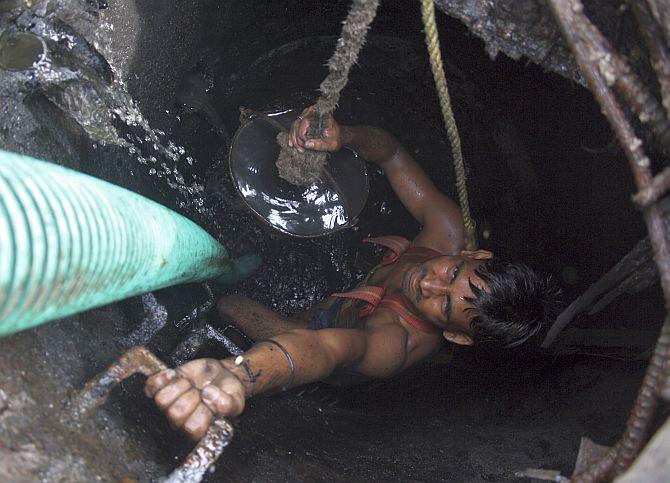On Wednesday, September 18, the Supreme Court denounced manual scavenging as 'most uncivilised and inhuman'.
'It is the notion that they are born to do this which needs to change.'
Sneha Bhattacharjee reports.

In February this year when Prime Minister Narendra D Modi washed the feet of sanitation workers at Kumbh Mela, his gesture was seen as symbolic of his support for them.
However, a symbolic gesture does not necessarily amounts to benefits for sanitation workers across the country, who risk their lives day in and day out without any protective gear.
Take the recent case of seven workers -- three employees and four sanitation workers -- who died after inhaling toxic fumes while cleaning the sewer of a hotel in Vadodara, Gujarat. The incident evoked angry reactions from several people on social media.
Mahindra Group Chairperson Anand Mahindra, sharing the news on Twitter, questioned what was stopping the authorities from employing safety measures. He even offered funds if that was the reason for the authorities's unwillingness to adopt safer methods of cleaning manholes.
But is it really a lack of funds that's stopping the governments to adopt mechanical methods of sewage cleaning or is there more than meets the eye?
National Convenor, Safai Karmachari Andolan, Bezwada Wilson, calls it the state government's denial to accept that manual scavenging is prevalent.
Citing the example of Gujarat incident, Wilson says, "the government is downplaying the incident. They do not want to accept any machinery help or rehabilitation drive for the workers."
"We are willing to offer solutions to them, but the safai karmachari commission in the state has to be open to accepting them. They don't want to because that would destroy their image of a model state," he adds.
It is not just the denial of the government, but also the notion of "they were born to do this job" that has been reverberating in the minds of the state machinery.
'Log toh mil he jayenge (you will find people any way)' is the standard mindset. Caste plays an important role in determining this mindset too.
There is no point of all the modernisation when everything revolves around the fact that there are some castes that are born to be manual scavengers," says Bhasha Singh, author of the book Unseen: The Truth about India's Manual Scavengers.
As per the Prohibition of Employment as Manual Scavengers and their Rehabilitation Act, 2013, the practice of manual scavenging is referred to as 'manually or barehanded cleaning, carrying, disposing of, or otherwise handling in any manner, human excreta from the insanitary latrines'.
The Act disallows all kinds of employment that force individuals to engage with human excreta in any form manually.
However, the Act does not mention any provisions related to the death of manual scavengers and despite most deaths being caused by lack of safety equipment, it fails to explain what qualifies as 'appropriate safety gear'.
In 2014, the Supreme Court, while expanding the contours of the Act, declared Rs 10 lakh as compensation in case of death.
Singh notes, it is not just the compensation that the State machinery is supposed to provide to the family of the deceased worker, but also education and housing.
However, the State openly flouts the Supreme Court ruling by providing either compensation less than the requisite amount or employing the wife in the same job.
"The State machinery basically acts like a mediator. Once they enter into the job, the families are forced to decline on the compensation. They are made to believe how beneficial they have been by getting a 'job'. The families are in no position to ask for their compensation," Singh adds.
Both Singh and Wilson lament the fact that despite being an illegal activity since 1993, there have been no policy on eradication of manual scavenging.
"Instead there is a deliberate shift towards building more toilets and declaring states open defecation free," says Singh.
No questions are raised on where the "shit" is going?
According to Singh, not a single city can boast of having direct connection to sewer lines. "How is human waste being cleaned then?" she asks.
A classic example of State apathy is the declining allocation to the Self Employment Scheme for Rehabilitation of Manual Scavenger, launched in 2007 by the government of India.
In FY 2013-2014, the GoI allocated Rs 70 crore (Rs 700 million), it decreased to Rs 47 crore (Rs 470 million) in FY2014-2015 and further to only Rs 5 crore (Rs 50 million) in FY 2015-2016.
"Instead of focusing on how to construct sewage management systems, research and develop more on this sector, we are running towards building toilets that are lying unused," Wilson says.
Declaring a state open defecation free, he adds, will not serve a purpose. The government has to look at the human perspective -- who is cleaning those toilets, how are they doing it, do they have the requisite machinery?
"A safai karmachari is not keen on going into a manhole that stinks, it is the notion that they are born to do this, which needs to change," he observes.











